© 2014-

As radio felt the impact of television, the style of radio programming was forced to change. Live musical and dramatic performances gave way to disc jockeys who played the latest records. In the late 1950s the idea of Top 40 radio was born.
For those who grew up with it, the top-
By the 1960s PAMS ha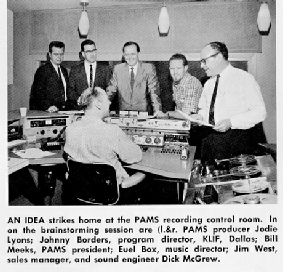 d become the world's most creative and dominant supplier of radio jingles. Almost every legendary station during the golden era of top-
d become the world's most creative and dominant supplier of radio jingles. Almost every legendary station during the golden era of top-
Whenever PAMS came up with a new idea and developed it into a series of jingles, many stations would build their entire image around the new jingle package. For a while it seemed as if the industry would wait to hear each new PAMS package so that they would know what to do next. Phrases like “Go Go”, “The In Sound”, “Fun Vibrations”, and “Music Power” became part of radio stations all over the world. The unmistakable PAMS sound was everywhere.
As PAMS created each new collection of mass-
For three decades, PAMS was the most influential and imitated source of radio jingles in the world, and an integral part of the sound of legendary stations. A great part of PAMS’ success was due to the ingenuity and musical excellence of the many writers, producers, engineers, and talent who worked there over the years.
Jingles in various forms remained important to almost all radio stations for decades, but by the 1990s, they started to sound old-
By the mid 1970s, however, changing trends in broadcasting, along with increased competition, began to have a serious impact on PAMS’ product and sales. Business difficulties ensued, and PAMS suspended operations in 1978. It remained legally dormant until 1990, when the corporation was bought and returned to active status with the intent of preserving the classic PAMS heritage.
PAMS was purchased in 1974 by Jonathan and Mary Lyn Wolfert who formed JAM Creative Productions. They, along with several other key people now at JAM, once worked at the original PAMS and had great respect for what PAMS means, as well as first hand knowledge of how PAMS product was produced.
After extensive legal research it was determined that the valid copyrights for the PAMS jingles are still held by the original PAMS corporation. But during the years that the company was inactive, several other parties offered re-


and station IDs

Listen to these PAMS jingles -
Series 26 -
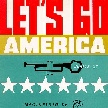
Series 25 -
Some cuts in the original release of this package feature the sound of two little girls, who are actually twin sisters.
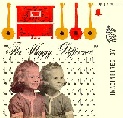
Series 27 -
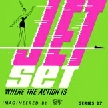
PAMS Recording studio in 1964
Photo: PAMS


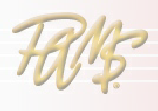
PAMS CREATIVE STAFF
Writers/Arrangers
Brian Beck, Euel Box, Bob Farrar, Ray Hurst, Jody Lyons, Bill Meeks, Bob Piper, Marvin Shaw
Female voices
Jackie Dickson, Mary Jo Grogan, Trella Hart, Terri Lee, Susie McCune, Jean Oliver, Judy Parma, Carol Piper, Tinker Rautenberg, Glenni Rutherford, Claire Stewart, Libba Weeks
Male voices
Billy Ainsworth, Dan Alexander, Brian Beck, Frank Bloebaum, Jim Clancy, Tommy Loy, Jody Lyons, Peyton Park, Marvin Shaw, Charlie Thompson
Thanks to PAMS and Jam Creative Productions for information used in this feature



Floor 2
Back to







and station IDs

